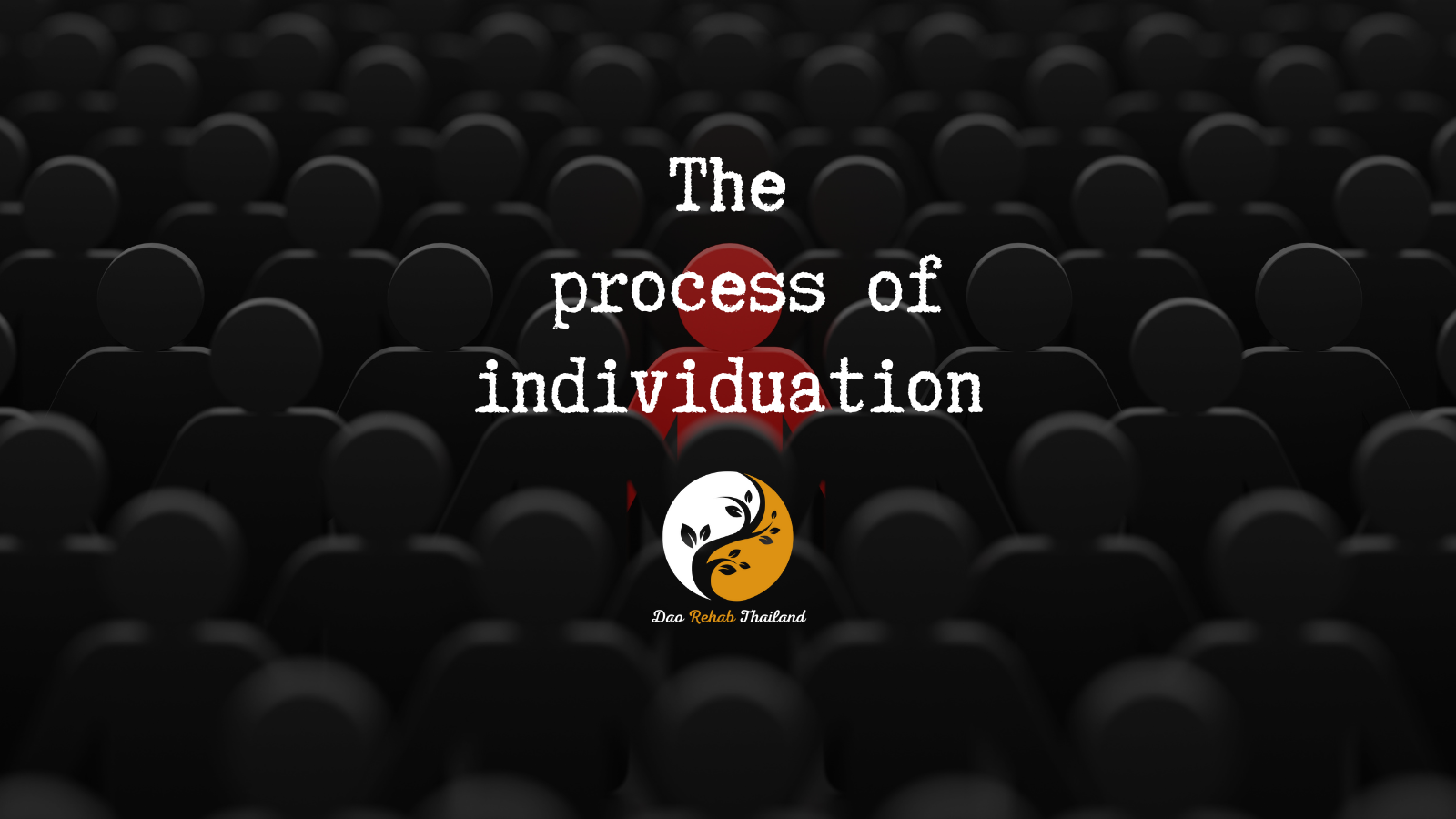
The process of individuation
The process of individuation
“Turning the impossible into possible”

"Detox from Drugs at a Luxury Holistic Center in Thailand and Israel"

Carl Jung, proposed a process of self-development in the individuation process
Carl Jung, a practical psychologist, proposed a method of self-development known as the individuation process. The goal of the process is to reach an ideal state of mental wholeness, in which all the potentials inherent within us are realized and all elements of the subconscious are brought to the light of awareness and harmoniously integrated into the structure of our character. Although absolute perfection cannot be achieved in the course of a human life, progress in this direction produces satisfaction and leads to the development of a character that is rooted in our uniqueness and that transcends social roles and expectations of our peer group and society at large.
"Holistic Center for Trauma, Addiction, and Mental Imbalance Treatment in Thailand"
“Come to the beginning of your journey to freedom from addiction to alcohol, drugs, and pills, and rediscover your life within the serene embrace of DaoTherapy Rehab in Thailand—where holistic healing meets empowering recovery.”
DaoTherapy Holistic Rehab
Key Elements of Drugs Detox:
Medical Supervision: Drugs detox must be conducted under medical supervision, as the body may experience withdrawal symptoms. These can include nausea, anxiety, muscle aches, and insomnia. A medical team will monitor and manage these symptoms to ensure the patient’s safety and comfort.
Holistic Therapies:
Holistic Therapies: Many detox programs incorporate holistic therapies such as mindfulness, yoga, and meditation to help individuals cope with stress and anxiety during the detox process. These therapies support the mind-body connection and contribute to overall recovery.
Tapering Process
Tapering Process: Drugs detox often involves a gradual tapering of the drug to reduce withdrawal severity. Doctors will slowly decrease the dosage over time to allow the body to adjust to lower levels of the substance.
Psychological Support:
Psychological Support: Like any addiction recovery process, detox from Drugs includes psychological support. This can involve counseling, therapy, or support groups to address the mental and emotional aspects of addiction.
Post-Detox Treatment:
Post-Detox Treatment: After completing detox, continuing treatment is crucial to prevent relapse. This often includes participation in ongoing therapy, group support, and the development of new coping strategies to maintain sobriety.
Individualization offers many advantages
Individuation offers many advantages over following the well-trodden paths of conformity. First, the process makes us more capable in life, for in striving for mental wholeness we increase the number of skills and character traits at our disposal, thereby increasing our ability to seize opportunities and deal with problems. Individuation is also an effective remedy for the diseases of despair, such as anxiety disorders, neuroses, depression, and certain forms of addiction. While these conditions can arise from many causes, one of the most common is a life unlived, or a sense of stagnation, coupled with a disturbing awareness of impending death. Individuation pushes us out of these trajectories of existence and places us on a purposeful and meaningful life path.
To achieve the benefits of individuation, one must take a step that is simple in theory but difficult in practice—turning our attention inward and evaluating life as objectively as possible in the current state of character. Radical self-acceptance is required, which includes the identification and acceptance of flaws and weaknesses, but also talents and strengths. Past mistakes and failures must be accepted and current conditions must be clearly grasped, recognizing that progress can only be made from where we are. Most importantly, we must accept that there is immense potential within us and that the possibilities for our development are unlimited. Self-acceptance in itself produces significant therapeutic benefits.
In addition to self-acceptance, Jung advocates increased acceptance of those close to us, especially family members. We must avoid wasting time in the tangle of boring family drama and accept any past abuse as a given condition of life. Playing the victim, wallowing in self-pity or blame, trying to change others or explain why we were abused, are a waste of life. The mature person will accept these sins as their own condition.
Adopting a life purpose or mission is an integral part of individuation, because mental wholeness is not achieved through passive meditation alone. Full engagement in life, achieved through a purpose or mission, leads to the realization of our potential and reveals unconscious content. There is no single right choice, but rather something must be found that is rewarding enough to maintain motivation and challenging enough to create the new experiences necessary for self-realization. We must be the ones to decide and not rely on others to choose for us.
As we walk the path of individuation, we encounter difficulties, failures, and mistakes. It is important to remember that we must live our vision and that each journey is unique. Individuation does not free us from the conditions of human existence. We are still haunted by our mortality, and suffering is inevitable. Jung believed that these situations should not be run away from or denied the feelings that accompany them, but rather that suffering should be experienced fully in order to move beyond it.
If we are stuck in a life of boredom, mediocrity, anxiety, depression or addiction, Jung’s method of self-development offers a way out. Our personality develops throughout life from sprouts that are difficult or impossible to notice, and only our actions reveal who we really are. Only in the evening will it be possible to see what the morning began.

contact us
Contact us with your questions
We would love to speak with you! Feel free to reach out with any questions.

get in touch
Schedule a free consultation
Schedule a free consultation with our team and let’s make things happen!
Jung's Individuation: The Path to Self-Development and Mental Wholeness
Carl Jung, a practical psychologist and founder of analytical psychology, proposed a unique method of self-development known as the individuation process. The goal of the process is to reach an ideal state of mental wholeness, in which all the potentials inherent within us are realized and all elements of the subconscious are brought to the light of awareness and harmoniously integrated into the structure of our character. Although absolute perfection cannot be achieved during a human lifetime, progress in this direction produces satisfaction and leads to the development of a character that is rooted in our uniqueness and goes beyond social roles and expectations of the peer group and society in general. Individuation invites us on a journey of self-discovery, self-acceptance, and self-fulfillment.
Advantages of Individuation
Individuation offers many advantages over walking the paved paths of conformity. First, the process makes us more capable in life, since in striving for mental wholeness we increase the number of skills and character traits at our disposal, thereby increasing our ability to seize opportunities and deal with problems. When we enrich the range of our psychological tools, we are better equipped to deal with the complexities of life and respond more appropriately to different situations. Individuation allows us to develop mental flexibility, creativity, and emotional resilience.
Second, individuation is an effective remedy for the diseases of despair, such as anxiety disorders, neuroses, depression, and certain forms of addiction. While these conditions can arise from many causes, one of the most common is a life unlived, or a sense of stagnation, coupled with a disturbing awareness of impending death. When we feel stuck or aimless, it is easy to enter into states of despair and become immersed in negative thoughts. Individuation pushes us out of these ruts and places us on a purposeful, meaningful path in life, providing us with a sense of purpose and enabling us to realize our potential. It encourages us to face challenges and grow through them, rather than running away from or denying them.
Step One: Radical Self-Acceptance
To reap the benefits of individuation, we must take a step that is simple in theory but difficult in practice—turning our attention inward and evaluating life as objectively as possible in our current state of being. Radical self-acceptance is required, which includes identifying and accepting flaws and weaknesses, but also talents and strengths. We need to look honestly in the mirror and accept who we are, with all that entails. This may sound intimidating or stressful, but it is a vital step in our growth process. When we fully know and accept ourselves, we are able to work with what we have and move forward in life more authentically.
We must accept past mistakes and failures and clearly grasp our current conditions, recognizing that we can only move forward from where we are. There is no point in dwelling on what was or wallowing in guilt and shame. Instead, we must recognize our current reality as the starting point for positive change. Every journey begins with a first step, and the more we accept ourselves and our situation, the more confident we can move forward. The courage to accept the past and live in the present is the key to future growth.
Most importantly, we must accept that we have immense potential within us and that the possibilities for our development are unlimited. We often perceive ourselves as small or worthless, but the truth is that each of us has an amazing capacity to grow, learn, and change. When we recognize our inherent potential, we open the door to real change and self-fulfillment. Self-acceptance in itself produces significant therapeutic benefits, as it frees us from negative thought patterns and allows us to experience compassion and love for ourselves. The more we learn to accept and love ourselves, the more we can radiate love and acceptance to the world around us.
Accepting Others
In addition to self-acceptance, Jung advocates increased acceptance of those close to us, especially family members. Often, we get stuck in the tangle of family dramas, wasting time and energy on past conflicts and hurts. We may be immersed in the role of the victim, in self-pity or blaming others, trying to change their behavior or understand why they hurt us. But as Jung points out, these are a waste of life. The mature person will accept these sins as their own condition, as part of the reality they must deal with. Accepting others does not mean agreeing with their behavior or giving up our personal boundaries, but recognizing that they are also human beings, with their own weaknesses and strengths.
Of course, this does not mean ignoring serious hurts or staying in destructive relationships. However, in many cases, releasing the past and accepting family members as they are can bring inner peace and allow us to focus on our own personal development. When we stop trying to change or fix others and accept them as they are, we are freed from the need to control and can build more mature relationships, based on understanding and compassion. True acceptance of others begins with accepting ourselves, and recognizing that we are all human, vulnerable, and have the potential for growth.
Adopting a Life Purpose
Adopting a life purpose or mission is an integral part of individuation, because mental wholeness is not achieved through passive meditation alone. Full engagement in life, achieved through a purpose or mission, leads to the realization of our potential and reveals unconscious content. When we have a clear goal to work towards, we find meaning and a sense of direction. We face challenges, acquire new skills, and learn about ourselves in the process. The journey to fulfill the goal becomes a tool for self-discovery and personal development.
It is important to emphasize that there is no one right choice of life purpose. Each of us is unique, with our own inclinations, talents, and aspirations. The key is to find something that inspires us, something rewarding enough to keep us motivated and challenging enough to create the new experiences needed for self-fulfillment. It could be a creative project, a spiritual journey, a fulfilling career, or anything else that speaks to our hearts. What is important is that we choose for ourselves, out of a deep understanding of who we are and what we want, and not out of blind obedience to social expectations or the desires of others. When we act in accordance with the truth of
Central insights
1. Individuation is a process of self-realization and progress toward spiritual wholeness.
2. Radical self-acceptance is required to begin the process of individuation.
3. Acceptance of others, especially family members, is also important in this process.
4. Adopting a purpose or life mission is an integral part of individuation.
5. Individuation does not free us from the conditions of human existence, but it does create satisfaction.
6. To avoid deviating from the path, we must be aware that we will encounter difficulties and make mistakes.
7. When suffering comes, we must experience it fully in order to move beyond it.
8. Individuation offers a way out of situations of boredom, mediocrity, anxiety, depression, or addiction.
9. Only our actions reveal who we really are.
10. Only in the evening will it be possible to see what the morning began.
practical advice:
1. Focus on yourself and evaluate your life as objectively as possible.
2. Accept yourself, including your weaknesses and strengths.
3. Accept your past and the current conditions of your life.
4. Recognize the infinite potential that lies within you.
5. Embrace a life purpose and move toward it in a consistent and disciplined manner.
6. Don’t be discouraged by obstacles and failures along the way.
Psychological Support:
Psychological Support: Like any addiction recovery process, detox from Subutex includes psychological support. This can involve counseling, therapy, or support groups to address the mental and emotional aspects of addiction.
Thought provoking questions:
1. What are the ways you can accept yourself and your past to begin the individuation process?
2. How can you identify your inherent potential and begin to realize it?
3. What is the life goal or mission you would like to embrace to move forward in the individuation process?
4. How will you deal with obstacles and failures on the path to your self-actualization?
5. In what ways can you fully experience your suffering in order to move beyond it?








